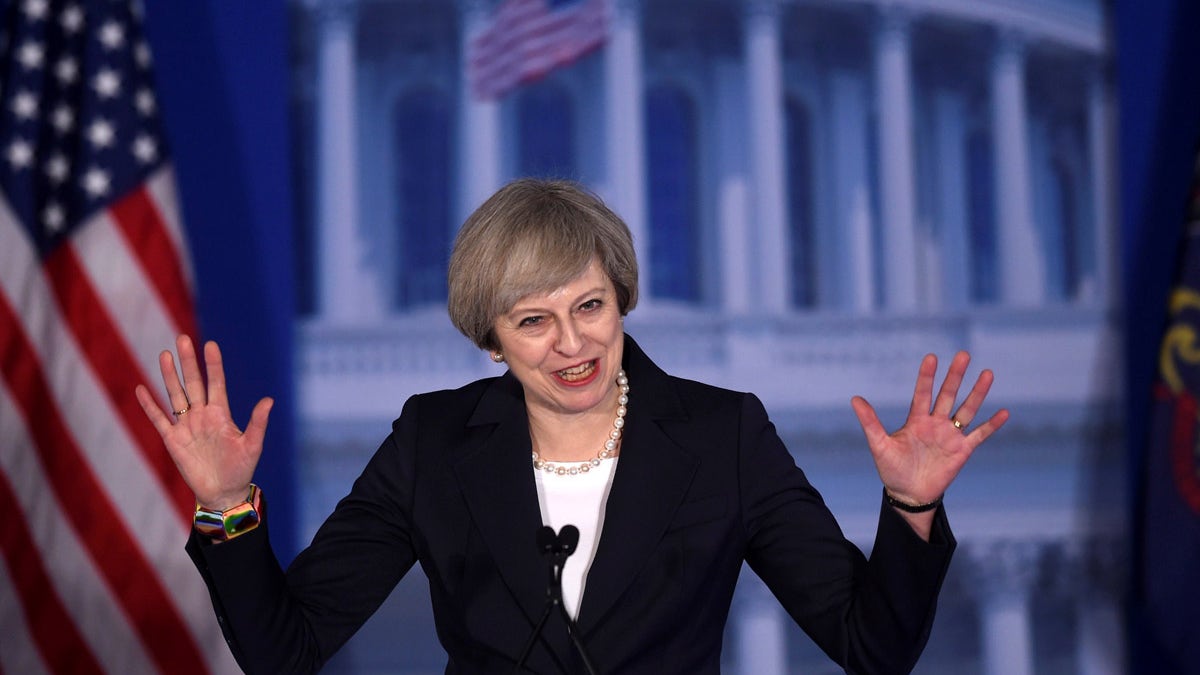
British PM Teresa May speaks during a Republican conference in Philadelphia, Pennsylvania on Jan. 26, 2017. (Reuters)
"Your problems will be our problems, and when you look for friends, we shall be there." I thought about this promise made by Margaret Thatcher to Ronald Reagan during my official visit to London this week. The United States and the United Kingdom share a powerful alliance that is unique among nations. In my meetings with Prime Minister Theresa May, senior leaders of government, and English clergy, we discussed the need to strengthen this alliance to meet the challenges of an increasingly chaotic world.
It is this friendship, this “special relationship,” that was the center of my conversation with Prime Minister May. Our special relationship with the United Kingdom is built on a foundation of shared values. The prime minister outlined these values best when she introduced herself to President Trump earlier this year as “a fellow Conservative who believes in the same principles that underpin the agenda of your Party…. The value of liberty. The dignity of work. The principles of nationhood, family, economic prudence, patriotism—and putting power in the hands of the people.”
Prime Minister May and I agreed that these very principles—of working hard to empower the people and to leave the world a better place—should guide our efforts in the fight against terrorism. Addressing the threat of homegrown radicalization by jihadist groups requires an approach that protects our citizens’ safety just as it does their liberties. That’s why MI5 Director General Andrew Parker and I agreed on the importance of creating a clear legal framework to facilitate the sharing of electronic data between our two countries.
In coordination with UK officials, I am finalizing data-sharing legislation that would protect the rights of citizens while also giving law enforcement the tools they need to keep us safe. It is this type of close collaboration, driven by shared principles and shared objectives, that exemplifies the unique ability of our two countries to build a more secure and prosperous world.
For many years, the United Kingdom and the United States have worked closely to fight terrorist groups overseas, ISIS being foremost among such groups. Ultimately, victory over ISIS will come with the revival of human rights, democratic principles, and freedom in the Middle East. But this revival won’t happen on its own; we must speed it along by taking President Reagan’s approach: to use “a humanitarian velvet glove backed by a steel fist of military force.” This approach will help us win freedom for the people of Syria and Iraq. And make no mistake: these people desperately need our help.
In my conversation with the Bishop of Southwark, the Rt. Revd. Christopher Chessun, I learned of the horrific violence perpetrated against Christians in Syria and the desecration of ancient heritage sites. Throughout his many travels to the region, Bishop Chessun has been a strong advocate on behalf of Syria’s victimized communities. By partnering with UK government officials and ecclesiastical leaders, we can build alliances at all levels of society to protect the most vulnerable.
The experiences of marginalized communities such as Christians in Syria remind us that the struggle for human freedom is ongoing—and the need to promote individual liberty is more urgent today than ever before.
That’s why I emphasized the importance of defending democracy in a special address I delivered to the students of Oxford University. The university invited me to speak in commemoration of President Reagan’s historic address to the Oxford Union twenty-five years ago. In my remarks, I reminded the audience that from the same podium, President Reagan had announced the formation of the National Endowment for Democracy, or NED, an initiative I am proud to have championed in Congress. The NED’s role is as important as ever in promoting peace, order, and security in troubled regions across the world. As President Reagan said, “the only cure for what ails democracy is more democracy.”
Just as in Reagan’s time, our world is witness to evil ideologies that threaten the lives and liberty of innocent civilians. But the historic friendship between the United Kingdom and the United States—and our commitment to shared values–will ensure that the cause of freedom will prevail.








































